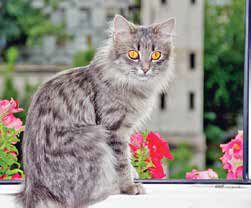- Environmental allergies are more common than food allergies. True food allergies are relatively rare in cats, but inhaled environmental allergens such as pollen, dust, cleaning products, and perfumes commonly trigger allergic reactions in cats. All these things can trigger an allergic reaction in susceptible cats. Common symptoms of inhalant allergies in cats include itchiness, hair loss, coughing, and sneezing. Depending on what your cat is allergic to, she may experience symptoms year-round or just when her allergens are present in the environment (for example, during pollen season).
- Your sneezy cat could have allergic bronchitis. Allergic bronchitis is inflammation of the bronchi (airways leading to the lungs) caused by an allergic reaction. In this condition, whenever your cat inhales something that she is allergic to, the offending particles contact the cells lining her airways and trigger an allergic response. This will manifest as coughing and even difficulty breathing. If your cat is struggling to breathe, she should be examined by a veterinarian immediately.
- Don’t forget to treat for fleas! Flea allergy dermatitis (FAD) is the most common cause of allergies in cats. Cats suffering from FAD react to the flea saliva that contacts the skin when a flea bites. Even a single flea bite can trigger a dramatic itchy reaction, complete with red bumps and sores. The cat’s haunches are often the itchiest, but any part of the body can be affected. Some cats lick and chew so vigorously that they create bald spots and open sores. This is one allergy that is easy to prevent: Simply keep your cat and all other pets in the household on year-round flea prevention.
- Allergy testing can be done for cats. There are two ways to test for allergies in cats: skin testing and blood testing. Skin tests (intradermal allergy testing) are the gold standard for environmental allergies, but many owners opt for blood tests due to the convenience. Allergy testing can be expensive, but knowing what your cat is allergic to will allow you to avoid allergens where possible and to know when she will likely need treatment. Cats can also receive allergen specific immunotherapy, where a custom serum is given over several months to desensitize your cat to her problematic allergens. Immunotherapy is not effective for food allergies.
- Proteins are the most common cause of food allergies. While you have likely heard claims of pets being allergic to corn and wheat, proteins such as chicken, beef, and egg are the more common culprits. Diagnosing a food allergy can be tricky, because many cats with food allergies have the same itchy-skin symptoms as cats with environmental allergies. The best way to determine whether your cat has a food allergy is to do food trials, where you feed a new diet that doesn’t have the suspected ingredient for eight to 12 weeks. After that period, do a “challenge” by feeding a food that includes the suspect. If the cat’s symptoms return, that ingredient was the problem. If they don’t, testing for another ingredient may be useful.




